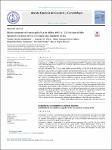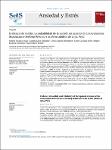Measurement of coronaphobia in older adults: validation of the Spanish version of the Coronavirus Anxiety Scale [Medición de la coronafobia en adultos mayores: validación de la versión en español de la Coronavirus Anxiety Scale]

View/
Descargar
(application/pdf: 690.5Kb)
(application/pdf: 690.5Kb)
Date
2021-11-12Author(s)
Caycho-Rodríguez, Tomás
Vilca, Lindsey W.
Peña-Calero, Brian Norman
Barboza-Palomino, Miguel
White, Michael
Reyes-Bossio, Mario
Metadata
Show full item recordAbstract
Background and objective
The Coronavirus Anxiety Scale (CAS) is an instrument that measures the severity of anxiety due to COVID-19 or coronaphobia. In the context of the COVID-19 pandemic, older adults are the most vulnerable age group; therefore, the aim of the study was to evaluate the psychometric properties of the CAS in this group.
Materials and method
274 Peruvian older adults participated (Mage = 67.86; SD = 6.34, 64.6% women). In addition to the CAS, the 2-item Patient Health Questionnaire (PHQ-2), and 2-item Generalized Anxiety Disorder Scale (GAD-2) were applied. Confirmatory Factor Analysis (CFA) was used to assess the factor structure of the CAS and Item Response Theory was used to analyze item characteristics. A sequence of hierarchical variance models was used to evaluate the measurement invariance of the CAS according to age. To assess reliability, Cronbach's alpha coefficient (α) and the omega coefficient (ω) were used. The correlations between the CAS score and the scores of the PHQ-2 and GAD-2 scales were calculated with Pearson's correlation coefficient (r).
Results
The results of the CFA indicated that the unidimensional model of the CAS fitted the data adequately and showed very good reliability (α and ω ≥ .83). Likewise, all items provided high information and adequate discrimination, which allowed for better detection of average and high levels of coronaphobia in the older adult population. However, the CAS did not show evidence of being strictly invariant between older adults aged 60–65 years and 66–86 years. The CAS showed significant correlations with anxiety (r = .72; [95%CI: .66, .87] p < .01) and depression (r = .53; [95%CI: .43, .76] p < .01).
Conclusion
The CAS in Spanish shows evidence of validity based on internal structure, convergent and divergent validity, as well as an adequate reliability estimate to assess coronaphobia in older adults. The CAS can be used to detect average and high levels of coronaphobia in the older adult population.
Mostrar más
Antecedentes y objetivo
La Coronavirus Anxiety Scale (CAS) es un instrumento que mide la severidad de la ansiedad por la COVID-19 o coronafobia. En el contexto de la pandemia de la COVID-19, los adultos mayores son el grupo de edad más vulnerable; por lo tanto, el objetivo del estudio fue evaluar las propiedades psicométricas del CAS en este grupo.
Materiales y método
Participaron 274 adultos mayores peruanos (Medad = 67.86; DE = 6.34, 64.6% mujeres). Además del CAS, se aplicaron el 2-item Patient Health Questionnaire (PHQ-2) y el 2-item Generalized Anxiety Disorder Scale (GAD-2). Se utilizó un Análisis Factorial Confirmatorio (AFC), para evaluar la estructura factorial del CAS y la Teoría de Respuesta al Ítem, para analizar las características de los ítems. Se utilizó una secuencia de modelos de varianza jerárquicos para evaluar la invarianza de medición del CAS según edad. Para evaluar la confiabilidad, se utilizó el coeficiente alfa de Cronbach (α) y el coeficiente omega (ω). Las correlaciones entre el puntaje del CAS, los puntajes de las escalas PHQ-2 y GAD-2, se calcularon con el coeficiente de correlación de Pearson (r).
Resultados
Los resultados del AFC indicaron que el modelo unidimensional del CAS ajustó adecuadamente a los datos y mostró una muy buena confiabilidad (α y ω ≥ .83). Asimismo, todos los ítems brindaron una alta información y adecuada discriminación; lo que permitió detectar mejor los niveles promedio y alto de coronafobia en la población de adulta mayor. Sin embargo, el CAS no mostró ser estrictamente invariante entre adultos mayores de 60 a 65 años y 66 a 86 años. El CAS mostró correlaciones significativas con la ansiedad (r = .72; [IC95%: .66, .87] p< .01) y depresión (r = .53; [IC95%: .43, .76] p< .01).
Conclusión
Se concluye que el CAS en español muestra evidencias de validez basado en la estructura interna, validez convergente y divergente, así como, una estimación de la fiabilidad adecuada para evaluar la coronafobia en adultos mayores. El CAS se puede utilizar para detectar niveles medios y altos de coronafobia en la población adulta mayor.
Mostrar más
Bibliographic citation
Caycho, T., ...[et al.]. (2021). Measurement of coronaphobia in older adults: validation of the Spanish version of the Coronavirus Anxiety Scale [Medición de la coronafobia en adultos mayores: validación de la versión en español de la Coronavirus Anxiety Scale]. Revista Española de Geriatria y Gerontologia, 57(1), 20 - 27. https://doi.org/10.1016/j.regg.2021.09.001
Collections
The following license files are associated with this item:
Related items
Showing items related by title, author, creator and subject.
-
Evidence of validity and reliability of the Spanish version of the Coronavirus Reassurance-Seeking Behaviors Scale in the adults of Lima, Peru [Evidencia de validez y confiabilidad de la versión en español de la Coronavirus Reassurance-Seeking Behaviors Scale en adultos de Lima, Perú]
Vivanco-Vidal, Andrea; Saroli-Araníbar, Daniela; Caycho-Rodríguez, Tomás; Carbajal-León, Carlos; Barboza-Palomino, Miguel; Reyes-Bossio, Mario (Sociedad Española para el Estudio de la Ansiedad y el Estrés (SEAS), 2021-10-05)Acceso abiertoIntroducción y objetivos: Los comportamientos de búsqueda de seguridad permiten seguridad frente a una posible situación amenazante. Así, el objetivo fue adaptar y evaluar las propiedades psicométricas de la Coronavirus ... -
Predictors of mental health during the COVID-19 pandemic in older adults: the role of socio-demographic variables and COVID-19 anxiety
Caycho-Rodríguez, Tomás; Tomás, José M.; Vilca, Lindsey W.; García Cadena, Cirilo H.; Rojas-Jara, Claudio; White, Michael; Peña-Calero, Brian Norman (Taylor & Francis Group, 2021-06-22)Acceso cerradoABSTRACT The objective of this study was to evaluate factors related to the mental health of Peruvian older adults during the COVID-19 pandemic. The study had a cross-sectional and observational design. A total of 274 ... -
Measurement of the will to live in older adults: Transcultural adaptation, validity and reliability of the Will-to-Live Scale [Medición de la voluntad de vivir en adultos mayores: adaptación transcultural, validez y confiabilidad de la Will-to-Live Scale]
Caycho-Rodríguez, Tomás; Tomás, José M.; Ventura-León, José; Sancho, Patricia; Cabrera-Orosco, Isabel; Barboza-Palomino, Miguel (Elsevier, 2020-02-10)Acceso cerradoRESUMEN Objetivo La Will-to-Live Scale (WTLS) es utilizada para medir la voluntad de vivir en adultos mayores; sin embargo, no existe una versión en español. El objetivo del estudio fue traducir la WTLS al español, evaluar ...




